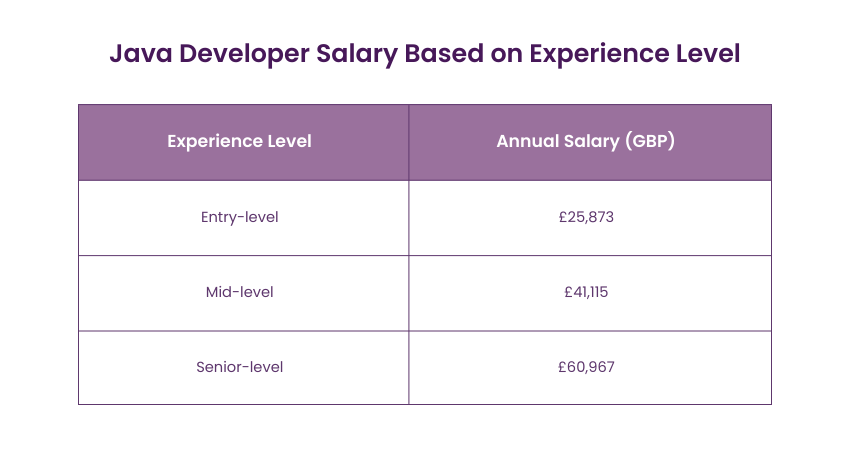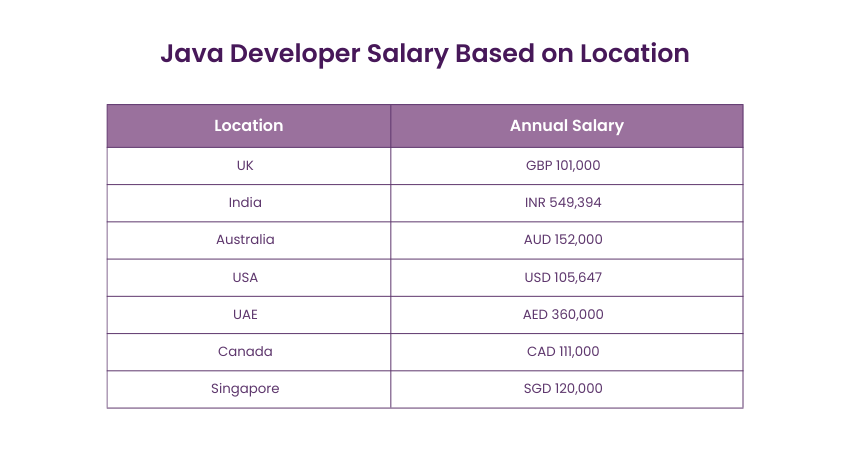We may not have the course you’re looking for. If you enquire or give us a call on +08000201623 and speak to our training experts, we may still be able to help with your training requirements.
Training Outcomes Within Your Budget!
We ensure quality, budget-alignment, and timely delivery by our expert instructors.

Technology is an ever-evolving field, and Java stands out as a language that adapts swiftly to these changes. The demand for Java Developers is high, making their salaries a hot topic, whether for seasoned professionals or beginners.
Java Developers are pivotal in creating top-tier business applications and designing Android-based solutions. Their role as change-makers is reflected in their compensation.
In this blog, we'll explore the various factors influencing Java developer Salaries, including skills, experience, location, and industry. If you're curious about why Java developers are highly sought after by leading tech companies worldwide, this post is for you.
Table of Contents
1) Who is a Java Developer?
2) Average Salary of a Java Developer
3) Java Developer Compensation and Statistics and Percentiles in UK
4) Factors Influencing Java Developer Salary
5) Conclusion
Who is a Java Developer?
A Java programmer is a person who is skilled in the Java programming language, and hence, he/she writes, designs, tests, debugs, and maintains software applications using Java. They exhibit great teamwork with other experts in technology adoption and their team develops applications that are robust, scalable and secure.
Their tasks are to write convenient, neat and effective code, debug the software and suggest application architecture ideas. Moreover, due to the scalability and liberal architecture of this programming language, developers can find themselves working not only in the financial, healthcare, telecommunication, and gaming spheres but also in many other industries as well.
Average Salary of a Java Developer
The average salary of developers who have just been introduced to Java varies a lot depending on the place, experience, and industry in which they work. In the whole United Kingdom, the average made annually by a Java developer is around £50,000.
Junior developers can expect pay rates starting with £30k – £40k; the best professionals with specific skills might be paid £60k – 80k and even more. Incentives in the form of bonuses, benefits and a possibility for advancement alongside these sums, as a rule, supplement these figures.
Java Developer Salary Based on Experience Level
A developer's experience plays a significant role in their salary. Here's a breakdown:

a) Entry-Level (0-2 years): Entry-level Java Developers can expect to earn between £30,000 and £40,000. They typically assist senior developers in writing basic code and learning industry best practices.
b) Mid-Level (2-5 years): With a few years of experience, salaries typically rise to the £45,000-£55,000 range. Mid-level developers often take on more complex projects and may begin to mentor junior colleagues.
c) Senior-Level (5+ years): Senior Java Developers with significant expertise can command salaries above £60,000. They frequently lead teams, handle advanced programming challenges, and shape application architecture.
Learn more about programming in Java with our Java Programming Course!
Java Developer Salary Based on Location
Location can heavily impact salaries due to differences in the cost of living and demand for tech professionals. Here's a brief insight:

U.K.: The average salary of a Java Developer in the U.K. is variable and strictly depends on location. In London, for example, where everything is costly and the need for technology professionals is high, a Java Developer has a salary ranging from £60,000 to £90,000. Other great cities that offer slightly less are Manchester, Birmingham, Leeds, and Edinburgh, at an average of between £40,000 and £60,000.
India: The boom of technology in India has opened great vistas to Java Developers. But mid-level developers all over the world, ready to jump into this change, can expect to earn somewhere in the range of INR 800,000 to INR 1,200,000 annually in cities like Bengaluru, Hyderabad, or Pune. While in other cities, the wage level is slightly reduced and is placed in the range of INR 600,000 up to INR 1,000,000.
Australia: In Australia, Java Developers receive very attractive salaries, with the highest-paying jobs in cities such as Sydney and Melbourne. In these respective places, a Java developer can pocket around AUD 90,000 to AUD 130,000 in a year. In others, like Brisbane and Perth, the cost of living is high, but pay scales are available in the range of AUD 80,000 to AUD 110,000.
USA: USA still has numerous top paid options for Java Developers: the cities they belong to, along with the respective pay scale, starting from $90,000 going up to $140,000, are those where technology is having a strong hold. This level of demand in those regions pushes compensation much higher, often above $150,000 per year for senior-level professionals.
UAE: Java developer salaries indicate a tech-professional demand. In the UAE, more specifically in Dubai and Abu Dhabi, Java Developers report compensation on an annual basis within the span of 180,000 to 240,000 AED, with senior professionals enjoying the possibility of earning over 250,000 AED yearly, considering high demand and high competition in hiring.
Canada: Canada is one such country where the technological sector has been rising for the past five years, and Java Developers fetch handsome figures. It is pegged at CAD 85,000 to CAD 110,000 in both Toronto and Vancouver. Other cities, like Montreal and Calgary, follow the same range, averaging from CAD 75,000 to CAD 100,000.
Singapore: Singapore is the hub of technological innovation in Southeast Asia, with an average salary for a Java developer ranging between SGD 80,000 and SGD 110,000. The competitive market will pay these demanded tech professionals a figure higher than the rest, most specifically the ones holding specialisation skills.
Java Developer Compensation Statistics and Percentiles in the UK
In the UK, Java Developers have diverse salaries within the range £ 25000 – £ 80000 depending on experience, geographical location and specialisation. Here's an overview of compensation statistics and percentiles:
Average and Median Salaries:
a) Average Salary: Approximately £69,700 per year
b) Median Salary: Around £67,500 per year.
Salary Percentiles:
a) Top 10%: Earn over £97,500 annually
b) Top 25%: Earn more than £82,500 per year
c) Bottom 25%: Earn less than £55,000 annually
d) Bottom 10%: Earn under £41,500 per year
Regional Variations:
a) London: Median salary is £100,000 per year
b) UK excluding London: Median salary is £60,000 per year
Experience-Based Salaries:
a) Entry-Level (less than 1 year): Average total compensation of £25,873
b) Early Career (1-4 years): Average total compensation of £35,907
c) Mid-Career (5-9 years): Average total compensation of £46,000
d) Experienced (10-19 years): Average total compensation of £65,000
Factors Influencing Java Developer Salary
Many elements play a key role in deciding the salary of a Java Developer; some of them are mentioned below and are mostly considered by companies.
Geographic Area
Geographic location plays a vital role in deciding what salary a developer will receive. Salaries will typically be much higher in technology hubs like San Francisco, New York, or Seattle, where the demand is high, and the cost of living in those cities is more expensive. At the same time, the wage will most probably be much more modest in regions with affordable living costs.
Quite often, companies really consider the cost of living in the country of the developer. Developers from countries with a lower cost of living will not make as much as someone from Western Europe or the U.S. but can still have a competitive wage for their region.
Professional Experience
Experience, job tenure, and diversity in project exposure form some of the largest determinants of salary for a developer. One who is experienced, coupled with exposure to working on different kinds of projects and showing a good track record of delivering robust applications that scale up easily, will get significantly higher wages.
Employers value this experience often because it implies that the developer can board, hit the ground running, navigate challenges independently, and contribute positively toward the company's technical goals. Another driver to increasing earning potential is a leadership position, such as a team lead or project manager.
Market Dynamics
The other important factor will be market dynamics, which determines the salaries of Java Developers. The more demand there is for the development of more developers in specific Java frameworks or emerging technologies, the more pay there will be.
In this regard, the Java Developers in high demand are the ones knowledgeable in microservices architecture or cloud-native development. Since the present vision of the world is to make everything distributed and scalable. Economic trends, the rate of growth of the tech industry, and hiring trends across different business sectors are some of the other factors that determine compensation packages.
Conclusion
The salary of a Java developer is always based on many factors, including experience, location, certificates, and general market dynamics. Therefore, in the near and foreseeable future, raising awareness about these relevant factors would enable an aspirant and an experienced professional in this domain to manage their career path better. If you are starting out as a Java developer or want to progress in your career, being informed about these points can increase your potential earning and professional growth.
Try our Introduction To Java EE Training and learn about Java API in detail!
Frequently Asked Questions

Python and Java are similar, however, Java has more elaborate faculties in the anonym, enterprise, Android programming, and scalability fields. Start with Python because of its ease or with Java if you want structured programming ability.

Java remains one of the most popular, reliable and ever green programming languages today, and the forecast for the future is promising. Being an open source, solid, and platform agnostic, it has become one of the most popular choices for enterprise level, Android, and backend systems applications.

The Knowledge Academy takes global learning to new heights, offering over 30,000 online courses across 490+ locations in 220 countries. This expansive reach ensures accessibility and convenience for learners worldwide.
Alongside our diverse Online Course Catalogue, encompassing 17 major categories, we go the extra mile by providing a plethora of free educational Online Resources like News updates, Blogs, videos, webinars, and interview questions. Tailoring learning experiences further, professionals can maximise value with customisable Course Bundles of TKA.

The Knowledge Academy’s Knowledge Pass, a prepaid voucher, adds another layer of flexibility, allowing course bookings over a 12-month period. Join us on a journey where education knows no bounds.

The Knowledge Academy offers various Java Courses, including JavaScript for Beginners, Hibernate Training, Java Swing Development Training, and Java Engineering Training. These courses cater to different skill levels, providing comprehensive insights into Arrays in Java.
Our Programming & DevOps Blogs cover a range of topics related to Java Programming, offering valuable resources, best practices, and industry insights. Whether you are a beginner or looking to advance your Java Programming skills, The Knowledge Academy's diverse courses and informative blogs have you covered.







 Top Rated Course
Top Rated Course




 If you wish to make any changes to your course, please
If you wish to make any changes to your course, please


